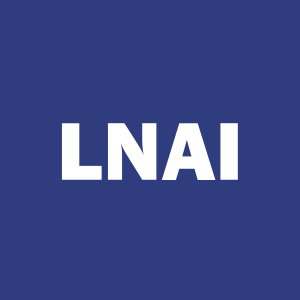Lunai Bioworks Launches AI-Powered Alzheimer's Disease Program, Expanding Neurodegenerative Pipeline
Rhea-AI Summary
Lunai Bioworks (Nasdaq:LNAI) launched a preclinical Alzheimer's program using its AI platform Augusta, reporting up to a 35% improvement in diagnostic accuracy by combining MRI, genomics, and metabolomics versus MRI alone. BioSymetrics, a wholly owned subsidiary, signed its first commercial contract last week to identify early Alzheimer's markers. Results were benchmarked on the ADNI dataset and used automated optimization across 22,000 MRI processing runs. The platform supports real-time distributed analysis via cloud architecture and is positioned to extend prior Parkinson's findings into broader neurodegenerative diagnostics.
Positive
- Diagnostic accuracy improvement up to 35% vs MRI alone
- Signed first commercial contract for early Alzheimer's marker identification
- 22,000 MRI processing runs automated for scalable modeling
- Platform validated across multiple neurodegenerative indications
Negative
- Program is currently preclinical with no clinical validation reported
- Results benchmarked on ADNI dataset without disclosed prospective or real-world validation
- No commercial contract value or financial terms disclosed
News Market Reaction
On the day this news was published, LNAI declined 1.55%, reflecting a mild negative market reaction. Argus tracked a peak move of +3.7% during that session. Our momentum scanner triggered 5 alerts that day, indicating moderate trading interest and price volatility. This price movement removed approximately $471K from the company's valuation, bringing the market cap to $30M at that time.
Data tracked by StockTitan Argus on the day of publication.
LOS ANGELES, CALIFORNIA / ACCESS Newswire / October 6, 2025 / Lunai Bioworks (Nasdaq:LNAI) today announced a major advance in Alzheimer's research: its AI platform, Augusta™, achieved up to a
The new program builds on Lunai's recent announcement regarding their findings for Parkinson's Disease, and fulfills their broader vision of applying advanced, multi-modal ML to improve diagnostics in complex disease areas. BioSymetrics, a wholly-owned subsidiary of Lunai and creators of the Augusta platform, is currently engaged in ongoing collaborations with research institutions and pharmaceutical companies to translate these findings into actionable biomarkers and clinical tools, including its first commercial contract to identify early markers of Alzheimer's disease signed last week.
By combining genetic, metabolic, and imaging data using distributed ML pipelines, BioSymetrics has shown that models built on integrated datasets significantly outperform those built on any single modality. This work, benchmarked using the Alzheimer's Disease Neuroimaging Initiative (ADNI) dataset, confirms the value of Augusta's proprietary approach to heterogeneous data integration in neurodegenerative disease research.
"I am delighted that we have signed our first commercial deal in our Alzheimer's program. Driving this as our approach reinforces the idea that Alzheimer's Disease is too complex for single-dimensional data," said David Weinstein, CEO of Lunai. "By leveraging AI to integrate and learn from the full biological context, including genetics, MRI imaging, metabolomics, and clinical records, we can generate models that are more predictive, more scalable, and more useful in the search for effective treatments."
Highlights of the work include:
Platform Expansion: Augusta™ now validated across multiple neurodegenerative indications.
An up to
35% improvement in diagnostic accuracy when combining MRI, genomics, and metabolomics vs. using MRI data alone.Automated parameter optimization across over 22,000 MRI processing runs, enabling scalable precision modeling for diverse patient populations.
Support for real-time and distributed analysis using cloud architecture.
These results echo previous findings from the literature showing that integrated multi-view models yield the highest performance on AD classification tasks.
About Lunai Bioworks
Lunai Bioworks Inc. is an AI-powered drug discovery and biodefense company pioneering safe and responsible generative biology. With proprietary neurotoxicity datasets, advanced machine learning, and a focus on dual-use risk management, Lunai is redefining how artificial intelligence can accelerate therapeutic innovation while safeguarding society from emerging threats.
Forward-Looking Statements:
This press release contains "forward-looking statements" within the meaning of the Private Litigation Reform Act of 1995 regarding the plans and objectives of management for future operations and market trends and expectations. Forward-looking statements can be identified by the fact that they do not related strictly to historical or current facts. Forward-looking statements are based upon our current assumptions, expectations and beliefs concerning future developments and their potential effect on our business. In some cases, you can identify forward-looking statements by the following words: "may", "could", "would", "should", "expect", "intend", "plan", "anticipate", "believe", "approximately", "estimate", "predict", "project", "potential" or the negative of these terms or other comparable terminology, although the absence of these words does not necessarily mean that a statement is not forward-looking. A forward-looking statement is neither a prediction nor a guarantee of future events or circumstances, and those future events or circumstances may not occur. You should not place undue reliance on forward-looking statements, which speak only as of the date of this Press Release. Forward-looking statements involve known and unknown risks, uncertainties, and other factors, that may cause our actual results, performance, or achievements to be materially different from any future results, performance or achievements expressed or implied by such forward-looking statements. The forward-looking statements included herein are based on current expectations and assumptions that involve numerous risks and uncertainties. Our plans and objectives are based, in part, on assumptions involving the continued expansion of our business. Assumptions relating to the foregoing involve judgments with respect to, among other things, future economic, competitive and market conditions and future business decisions, all of which are difficult or impossible to predict accurately and many of which are beyond our control. Lunai Bioworks encourages you to review the risk factors that may affect its future performance in its filings with the Securities and Exchange Commission. We are including this cautionary note to make applicable and take advantage of the safe harbor provisions of the Private Securities Litigation Reform Act of 1995 for forward-looking statements. We expressly disclaim any obligation to update or revise any forward-looking statements, whether as a result of new information, future events or otherwise. Additional information respecting factors that could materially affect the Company and its operations are contained in the Company's filings with the SEC which can be found on the SEC's website at www.sec.gov.
Media Contact:
David Weinstein
Chief Executive Officer
305-918-1980
ir@lunaibioworks.com
http://www.lunaibioworks.com/
SOURCE: Lunai Bioworks Inc.
View the original press release on ACCESS Newswire







